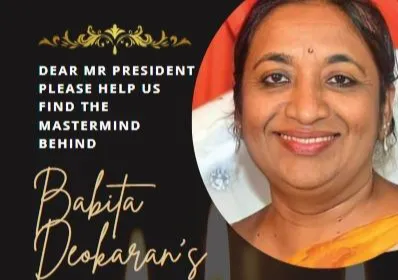
Every day the family of slain whistleblower, Babita Deokaran shares a post which calls on President Cyril Ramaphosa to find the mastermind/s.
Image: Supplied
THE recent Gauteng High Court ruling, which finally compelled the Greater Taung Local Municipality to reinstate whistleblower Thuso Bloem, has been rightly celebrated as a landmark victory. After a gruelling 13-year battle, a measure of justice has been served.
The court’s affirmation of the Public Protector’s remedial action is a
powerful judicial endorsement of the Protected Disclosures Act and a beacon of hope for countless others who risk everything to expose corruption.
However, to view this case as a simple triumph is to miss its most critical lesson. The agonisingly long road to this verdict is not a sidebar to the story; it is the story. It reveals a system that, while ultimately functioning in this instance, remains fundamentally broken, often hostile, and in desperate need of reform. The Bloem case is a stark microcosm of the systemic failures that continue to punish courage and protect the corrupt.
Mr Bloem’s ordeal began not in a courtroom, but in the corridors of power he sought to clean. A dedicated public servant and shop steward, his crime was to formally report egregious acts of corruption by the acting Municipal Manager, Mr Mofokeng, in 2011. The allegations, from the pre-emptive approval of his own travel claims to the irregular awarding of a tender to a relative, were serious and specific. The response was telling: instead of being investigated, Mofokeng suspended Bloem on spurious charges and ultimately signed his dismissal letter. This immediate retaliation is the first and most common weapon used against whistleblowers; the brutal weaponisation of public office and procedure to silence dissent.
This case, however, ascends from a simple act of victimisation to a textbook example of how the state itself can be marshalled against its most ethical employees. For over a decade, public funds; money earmarked for service delivery, infrastructure, and social grants; were used to bankroll the municipality’s relentless legal campaign against Mr Bloem and the Public Protector’s findings. This perversion of justice is precisely the issue highlighted by the Active Citizens Movement (ACM), which rightly demands an “unequivocal commitment that public funds will never be used to victimise whistleblowers”.
The Bloem saga is a perfect, chilling illustration of why this commitment is necessary. It demonstrates how scarce public resources are diverted from their constitutional purpose to become a tool for perpetuating injustice, effectively making taxpayers fund the persecution of those who protect their interests.
The second profound failure is the painfully slow pace of justice. The timeline is itself a form of punishment: twelve years and eight months from dismissal to final ruling. The Public Protector’s office, the very institution designed to be an agile shield for citizens, took four years to complete its investigation. The subsequent court challenge took another six. These delays are not neutral; they are an active injustice that inflicts immense financial ruin and psychological trauma on whistleblowers and their families.
It creates a powerful deterrent, signalling to any potential witness that speaking up could mean a decade of destitution and legal warfare. Justice delayed is indeed justice denied, and the South African system is guilty of delivering it far too slowly.
Perhaps the most alarming moment in this long saga was the institutional
abandonment of Mr Bloem. After initially filing papers to defend its own report, the Office of the Public Protector inexplicably withdrew from the court case in 2022. This left Bloem, a lone individual, dangerously exposed against a state-funded legal machine. His desperate pleas to various government departments and parliamentary committees fell on deaf ears. It was only the last-minute intervention of a civil society organisation, the Platform to Protect Whistleblowers in Africa (PPLAFF), that prevented a total miscarriage of justice.
This episode underscores a terrifying precarity: whistleblowers are forced to rely on under-resourced NGOs, while the powerful state institutions mandated by the constitution to protect them fail to do so.
This case, therefore, must be more than a victory; it must be a catalyst. The ACM’s call for action is not just timely, it is urgent. We must honour Thuso Bloem’s struggle by building a system that protects the next whistleblower in half the time, with twice the support.
First, constitutional bodies like the Public Protector and the South African Human Rights Commission must move beyond rhetoric. They must fulfil their mandates actively, consistently, and with expediency. They must be reliable pillars of support, not absent friends. Their institutional inertia fuels the legitimate calls for reform.
Second, the Protected Disclosures Act, now over two decades old, requires urgent and meaningful revision. The Act’s shortcomings are glaring. Reform must aim to create a more supportive environment, ensure drastically quicker resolutions, provide for tangible financial and psychological support for victims, and strengthen sanctions against those who orchestrate occupational detriments.
Third, the ACM’s demand for accountability in the misuse of funds must be heeded. Expenditure on litigating against whistleblowers must be explicitly classified as fruitless and wasteful. The Office of the Auditor-General must be empowered and directed to track, disqualify, and flag such expenditure. Officials who authorise it must be held personally liable. We must sever the financial pipeline used to fund persecution.
Finally, we must explore innovative ways to improve access to justice. The possibility of using specialised courts, such as equality courts, to hear whistleblower cases should be seriously investigated. This could provide a more accessible, sympathetic, and expedient forum for victims, bypassing the often technical and protracted processes of labour or high courts.
The tragic murder of whistleblowers like Babita Deokaran is the ultimate testament to the life-and-death stakes of this issue. Thuso Bloem survived his ordeal, but his 13- year battle is a scar on our democracy. We must build a system that robustly protects, rather than punishes, those with the courage to defend it. The high court’s judgment is a welcome end to a long chapter, but it must be the preface to a new era of robust and efficient whistleblower protection.
In honour of all who risk everything to fight corruption, the ACM proposes that August 23 be declared National Whistleblower Day. This day will remember the sacrificed, celebrate the brave, and educate the public on their vital role in our democracy.
The time for reform is not tomorrow; it is now. The time for promises is over. We must protect the protectors. Let us honour their courage with action.

ADVOCATE TSELISO THIPANYANE
Image: SUPPLIED
Advocate Thipanyane is a human rights lawyer and a member of the ACM. With an extensive career dedicated to constitutional law and good governance, he focuses on justice reform, anti-corruption, and strengthening democratic institutions. He is a prominent voice advocating for the protection of whistleblowers and the ethical use of public resources.
** The views expressed do not necessarily reflect the views of IOL or Independent Media.
THE POSThttps://thepost.co.za/
Related Topics: